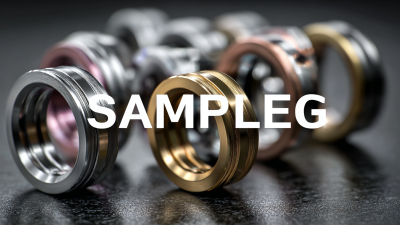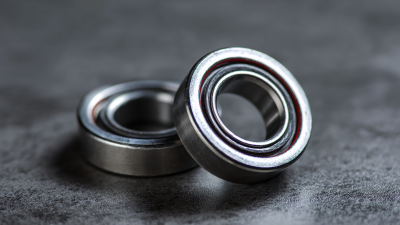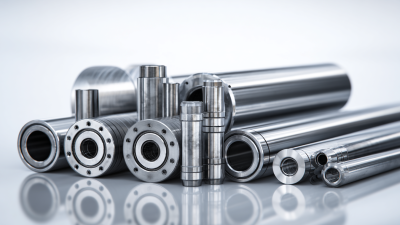Ultimate Guide to CE Certified Bearings Making an Impact in the EU Market
In the rapidly evolving landscape of the European Union, the demand for high-quality, compliant industrial components has reached unprecedented levels, with a notable surge in the usage of CE Certified Bearings for the EU Market. According to a recent report by the European Bearings Manufacturers Association (EBMA), the bearings market in Europe is expected to grow at a CAGR of 4.5% over the next five years, driven by the increasing emphasis on safety and regulatory compliance in various sectors such as automotive and manufacturing.

CE Certification is crucial, as it ensures that products meet stringent EU safety, health, and environmental protection requirements. This alignment not only enhances product reliability but also assures customers of the bearings' quality and performance in rigorous applications. As we delve deeper into the intricacies of CE Certified Bearings, this guide aims to provide a comprehensive comparison of different types available, highlighting their specifications, advantages, and impacts in the EU market.
CE Certification Process for Bearings: Understanding EU Regulations and Standards
CE certification is essential for bearings aiming to succeed in the European Union market. This certification process ensures that products comply with EU regulations, which are designed to guarantee safety, health, and environmental protection. For manufacturers, understanding the specific requirements for CE marking is crucial. The process typically involves a comprehensive assessment of the product, including its design, materials, and manufacturing processes, to ensure adherence to relevant directives and standards.
One of the key aspects of the CE certification process for bearings is the conformity assessment. Depending on the type of bearing and its application, different routes can be taken, such as self-certification or involving a notified body. Manufacturers must also prepare a technical file that includes detailed documentation of tests, analyses, and compliance with applicable standards. This ensures transparency and provides evidence during inspections, ultimately leading to a more robust market presence in the EU. By successfully navigating these regulations, manufacturers can not only gain CE certification but also enhance their reputation and customer trust within the competitive landscape of the EU market.

Impact of CE Certified Bearings on Market Competitiveness in the EU
CE certification has become a crucial benchmark for bearings in the European Union, directly influencing market competitiveness. As consumers and businesses alike prioritize safety and quality, CE certified bearings stand out due to their compliance with rigorous EU regulations. This certification not only assures product reliability but also enhances brand reputation, giving manufacturers a significant edge over non-certified counterparts.
Moreover, the impact of CE certification extends beyond mere compliance; it fosters innovation and encourages companies to invest in advanced technologies and sustainable practices. Manufacturers who embrace CE standards often improve their product quality and operational efficiency, which can lead to reduced costs and increased market share. In a landscape where consumers are increasingly informed and safety-conscious, the presence of CE certified bearings can be a decisive factor in purchasing decisions, further shaping competition within the EU market.
Case Studies: Successful Adoption of CE Certified Bearings in Various Industries
CE certified bearings are increasingly making their mark across various industries in Europe, reflecting a growing trend towards sustainability and innovation. Case studies reveal how sectors such as manufacturing, automotive, and construction have successfully integrated these bearings into their operations. For instance, a leading automotive company adopted CE certified bearings, resulting in enhanced safety and performance while reducing environmental impact. This move not only fulfilled regulatory compliance but also positioned the business as a responsible market leader.
Tip 1: When considering CE certified bearings, assess the supplier's reputation and compliance history. Partnership with reputable manufacturers guarantees adherence to quality standards and enhances the overall reliability of your products.
Another compelling example is in the construction industry, where companies are embracing CE certified bearings to improve the durability and efficiency of their sustainable building materials. The integration of innovative production technologies has allowed these companies to achieve significant advancements in performance while aligning with circular economy principles.
Tip 2: Evaluate how CE certified bearings can align with your sustainability goals. By choosing these products, businesses can not only ensure compliance but also contribute to a more circular economy through responsible sourcing and waste reduction practices.
The Role of Quality Assurance in CE Certified Bearings: Ensuring Reliability and Safety
In today's competitive EU market, the role of quality assurance in CE certified bearings cannot be overstated. These bearings, essential components in various industries from automotive to aerospace, must meet rigorous standards to ensure reliability and safety.
Quality assurance processes play a critical role in every stage of production, from material selection to final testing. By implementing robust quality control measures, manufacturers not only comply with CE marking requirements but also significantly enhance the performance and lifespan of their products.

Moreover, consumers increasingly demand transparency and assurance of quality in the products they use. CE certification provides peace of mind, assuring stakeholders that the bearings comply with the essential health, safety, and environmental protection requirements set by the EU.
This commitment to quality is pivotal for manufacturers striving to maintain a competitive edge while ensuring their products are safe and dependable. As the market continues to evolve, integrating comprehensive quality assurance practices will be key to fostering trust and driving innovation in the bearing industry.
Market Trends: Growth Rates and Demand for CE Certified Bearings in the EU Region
As the demand for high-quality components continues to rise, CE certified bearings have become essential in the EU market. The growth rates for these bearings reflect a strong trend towards enhanced safety and reliability in various industries. Recent studies indicate that investments in infrastructure and advancements in manufacturing processes are driving this demand, positioning CE certified bearings as a critical factor for competitiveness.
When exploring the market for CE certified bearings, it’s important to consider the specific industry applications. For instance, sectors like automotive and renewable energy are witnessing a surge in the utilization of these components. Tip: Ensure you stay updated on regulatory changes affecting CE certifications, which can impact market entry strategies. Furthermore, collaborating with certified suppliers can enhance your product quality and boost customer trust.
To capitalize on this growing trend, businesses must prioritize innovation and sustainability. Tip: Conduct regular market analysis to identify emerging demands and position your products accordingly. By focusing on customization and efficiency, companies can improve their market share in the competitive EU landscape for CE certified bearings.

Home
Products
Industrial Bearings
Deep Groove Ball Bearings
Self-Aligning Ball Bearings
Angular Contact Ball Bearings
Cylindrical Roller Bearings
Taper Roller Bearings
Spherical Roller Bearings
Bearing housing or Accessories
Miniature Bearing
Thrust ball bearing
Radial Spherical Plain Bearing
Pillow Block Bearing
Needle Roller Bearings
Automotive Bearings
Agricultural Bearings
Special Material Bearings
Industry Application
About Us
News
Contact Us











